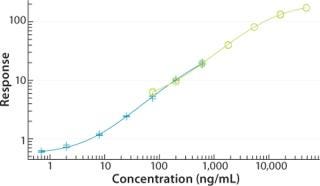Assay Miniaturization Saves Time, Labor, and Resources to Boost Overall Efficiency and ProductivityAssay Miniaturization Saves Time, Labor, and Resources to Boost Overall Efficiency and Productivity
July 1, 2009

ELISA-based sandwich assays have been a traditional workhorse across the drug discovery continuum for many years, but they have significant limitations. Gyros® offers a more efficient solution for performing high-throughput, automated immunoassays on a miniaturized, fluorescence-based platform.
A head-to-head comparison of the microfluidics-based Gyrolab® technology and ELISA demonstrates clear distinctions:
Speed — Gyrolab yields assay results within 1–1.5 hours (including sample preparation), whereas ELISA can take a full day to test only a few samples
Dynamic range — Gyrolab provides a broad dynamic range, three to four orders of magnitude, which means fewer dilutions compared than with ELISA
Sample volume — Gyrolab requires only 3 µL of sample versus typically 50 µL for ELISA
Precision — Gyrolab has an interassay coefficient of variation (CV) of <12%, compared with <25% for ELISA
Assay development time — Nanoscale assays on Gyrolab can be designed and running within days, compared with several weeks for ELISA.
What Is Gyrolab?
Gyrolab is a bioanalytical, automated, fluorescence-based system that employs microfluidics technology to perform immunoassays at nanoliter scale. At the core of the Gyrolab system is a compact disc (CD) microlaboratory, in which are embedded microstructures containing affinity capture columns. By integrating microfluidic CD technology with sensitive detection methods and intuitive software, this automated system yields quantitative assay data and highly reproducible results.
How Does It Work?
Designed based on microfluidic flow-through principles, Gyrolab’s CD-based microlaboratory allows only brief contact between the immobilized solid phase and the sample. This permits the desired reactions to take place while preventing undesirable nonspecific binding and matrix effects that can compromise the performance of static assay platforms, such as microplate-based ELISAs. The combination of affinity columns with a high capacity for the biotinylated capture reagent and fluorescently labeled reagents contribute to the broad dynamic range of Gyrolab. The miniaturized assay format uses nanoliter volumes, minimizing the consumption of precious samples and reagents. Extremely small sample volumes combined with short assay times makes multiplexing superfluous; Gyrolab combines the robustness of singleplexing with the flexibility of multiplexing.

Why Downsize Your Assays?
Shorter cycle times and faster results
Smaller sample volumes and less reagent consumption
Transfer of ELISA-based assays to the Gyrolab platform is quick and easy.
Value-Added Applications
Assay miniaturization and automation enable high-throughput screening and analysis of drug compounds, enhancing productivity across drug discovery and preclinical testing. As the numbers of biopharmaceuticals and especially protein therapeutics continue to increase in corporate pipelines, demand is growing for rapid, robust, efficient, and reproducible tools and methods for evaluating a compound’s safety, efficacy, metabolic, and toxic properties. Gyrolab offers particular advantages for applications such as pharmacodynamics (PD), pharmacokinetics (PK), antidrug antibody assays, detection of bioprocess impurities, biomarker assays. For protein production scale-up and optimization of bioprocesses, Gyrolab’s miniaturized format, fast turn-around time, broad dynamic range, and reproducibility provide tangible benefits.
You May Also Like






